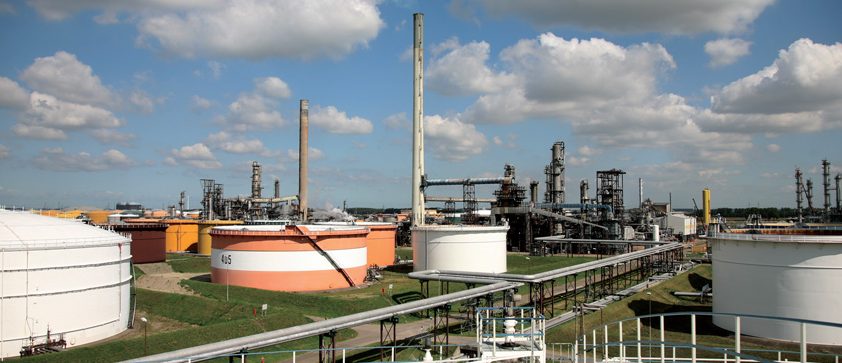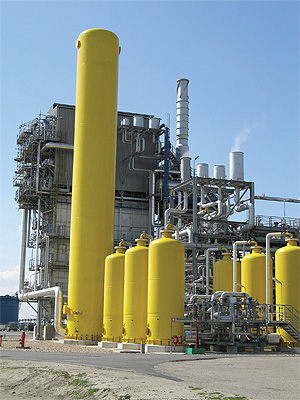
Total Refinery Netherlands: Pioneering the Future of Crude with State-of-the-Art Technology
A sophisticated operation
Total Refinery Netherlands (TRN) is one of the world’s most hi-tech crude oil refineries, harnessing advanced refining processes to produce a range of crude-based products, including petrol, LPG, kerosene, diesel oil, naptha, sulphur and other solvents.
Created as a joint venture between Total and Dow Chemicals, TRN is based in the Zeeland region of the Netherlands along the river Scheldt, which is the ideal location for the reception and distribution of products.
Indeed, an important factor in the success of TRN has been its position on a waterway that, for much of Europe’s history, has proved its worth in terms of significant commercial and strategic importance. The fact that the river flows through France, Belgium and the Netherlands before reaching the sea means that TRN can manage an efficient and effective logistics chain.
Having celebrated its 35th year in operation in 2009, TRN boats an illustrious history of continuous development and a long list of successful relationships with key industry players. “This anniversary was an important milestone in the history of the business and allows us to reflect on just how successful TRN has been,” comments Claude Gueguen, general manager at the site, elaborating on the company’s history. “The refinery began with distillation and refining for petrol, before quickly developing in relation to two distinct factors – the need by Dow Chemical for increased amounts of Naphta in the Netherlands and the continued growth of the diesel market in Europe.
“Consequently, a new hydrocracking unit began operating in 1986, and currently produces 68,000 barrels per day. This spurred the continuous pattern of growth that we have witnessed to date. We have been extremely lucky that both Total and Dow Chemical have demonstrated committed to permanent investment over the years, to ensure that TRN operates at its optimum level. In addition to the output from our hydrocraking unit, the refinery processes about 158,000 barrels of crude per day, which is sourced in Northern Europe, the Middle East and Africa.”
There were changes afoot at TRN last year, in respect of ownership, as Russian oil company Lukoil purchased a 45 per cent share in TRN, in an $600 million agreement between Lukoil and Total. As a result of this transaction, which was finalised in June 2009, Dow Chemical was replaced as Total’s partner. What hasn’t changed is the refinery’s status as one of the most sophisticated and best performing refineries in Western Europe. TRN continues to  employ 400 staff, making it one of the largest employees in Zeeland, and process 9.5 million tonnes of oil into high quality fuels each year.
employ 400 staff, making it one of the largest employees in Zeeland, and process 9.5 million tonnes of oil into high quality fuels each year.
The business undertakes the standard refining operations, including distillation and vacuum distillation, regenerative reforming, hydrocracking and the splitting of Naphta. This means that, together with the more traditional products such as petrol, oil and LPG, TRN produces a range of other products including solvents, lubricants, hydrogen, asphalt and even a range of biofuels. These are most commonly used for the markets in the Benelux countries, West Germany and Northern France.
Claude explains the slickness of TRN’s operation: “Our crude oil arrives at the MOT, which is a terminal at the Europort of Antwerp, before being piped directly to TRN. We have our own harbour and jetty on the Scheldt through which our products leave the refinery predominantly on transport barges. Combined with truck transport, this means that we can easily and quickly transport our products to clients around the world.”
It stands to reason that TRN should employ strict rules relating to protection, as the refining of products in dangerous areas means that safety is of paramount concern. Subsequently, the refinery’s stringent safety programme ensures that before each step or decision is made during the production of fuel, the organisation examines the consequences for the safety of the plant and its employees, any possible impact on the environment and the effects on the quality of the end product. Importantly, TRN is certified to a number of standards including the International Safety Rating System (ISRS) for safety, ISO 14001:2004 for environment and ISO 9001:2000 for quality, IVG certification for internal inspection and the ISPS standard for port security.
As safety is such a high priority, TRN creates a secure working environment for employees by issuing licenses before people can work at the refinery. It has also recently introduced a new work permit system, which allows the company to better manage risk, work well and pay close attention to safety during the execution of activities. Furthermore, authorisation to work at TRN applies to contractors as well as employees. Maintaining such high standards requires unwavering commitment from Total and Lukoil, as a large proportion of all investment always goes towards safety at the facility.
Similarly, TRN has a duty to minimise environmental damage and years of investment has been required to make the refinery one of the most eco-friendly in Europe – largely influenced by the Netherlands being a leading country in terms of environment protection. “I think we also benefit from being located in a relatively rural location, whereas many other Netherlands refineries are located in the built up areas of Rotterdam and other cities, so we have less of an impact on the environment,” Claude asserts.
“The regional authorities here in Zeeland give us our environmental approval and permits to operate, which adhere to the rules of the IPC and BAT, as described in the law for refining operations,” he continues. “This indicates that we have the best available technology in terms of the environment at the facility and, if you look at the benchmarks in Europe, we are in the top quartile. We’ve achieved this by regular investment into improving our environmental footprint.
“After all, we operate a sulphur plant with a sulphur yield extraction rate of over 99 per cent, a water treatment facility with links to a company in the Zeeland Seaport, and de-NOx systems on the stacks of our facility. In fact, our NOx emissions are in the bottom rankings in Europe. We’re constantly looking to implement new technologies to reduce our impact on the environment.”
In order to keep the refinery working at optimum capacity, TRN orchestrated a major overhaul of the refinery last June, which involved the biggest maintenance shutdown the refinery has experienced to date. The carefully planned shutdown was a huge success and involved an intensive clean of the production facilities, as well as the implementation of a number of key modernisation projects. As a result, a large number of burners in the furnaces were renewed, so that less NOx would be emitted, and a larger gas pipeline was built to allow more gas in the furnaces to be lit, thereby reducing emissions of sulphur dioxide (SO2). In addition, one of TRN’s heat exchangers was replaced, allowing the refinery to use significantly less energy, and emit less CO2 and other greenhouse gases.
In total, about 500,000 man-hours were clocked in order to undertake the maintenance and 1800 extra staff were deployed. On the busiest days of the overhaul, 2200 people were at work. This required even tighter security measures than TRN usually demands, especially as many of the workers were using scaffolding, cranes and heavy tools. Security training encompassed a special instruction programme for TRN’s own staff and for the employees of its contractors.
All of the refinery’s factories were restarted between June and July 2009, and TRN ensured all residents in the refinery’s surrounding villages were kept fully informed of the work in progress in order to minimise inconvenience. So far, the refinery has seen a major maintenance shutdown every two years but from now on, an overhaul will be carried out every five years with one or more plants being temporarily decommissioning in the interim.
Concern for its neighbouring communities is not limited to the recent overhaul and anticipating its ramifications. In fact, TRN has been dedicated to supporting the community since its establishment and has proved to be one of the most valuable industrial businesses in Zeeland. The company’s strong in-house training department works in conjunction with training facilities at Total, as well as with local suppliers and universities, to take on up to 30 newcomers every year. Most of these new additions to TRN come from the local region and the refinery is seen as a strong partner for the local economy, not only from an employment perspective but also from its use of regional contractors.
“We spend a lot of time and money on training, especially for new employees who benefit from the experience of our older employees,” Claude explains. “As the refinery is over 35 years old, many of our personnel are reaching retirement age, which means we need to find replacements, so we will actively recruit from our local regions. We also gain a lot of support from the local authorities that recognise our contribution to the region and want to help us develop in the future. Over the coming years, we’re participating in a number of projects that will benefit the community as a whole; Total is the leader for investment in solar energy in Europe, holding a strong policy in renewable energy, which we intend to follow.”
With such awareness on its effects on others and the environment, coupled with its endeavours in relation to progression, TRN is poised for continued success, as Claude concludes: “The future for the refinery is bright. We are in a strong position to evolve with the industry and roll with the market changes, looking towards diesel, biofuel and jet fuel production. We’re one of the main sites in Europe for Total, so our partners consider our refinery to be a key tool for future developments. This, coupled with our progress in local projects for renewable energy, means we are set for sustained growth. Though crude refining remains our core business, I would say that the integration of TRN in Zeeland and the local communities is the real strength of the refinery.”
TRN Total – Total Raffinaderij Nederland
Services: Crude refinery